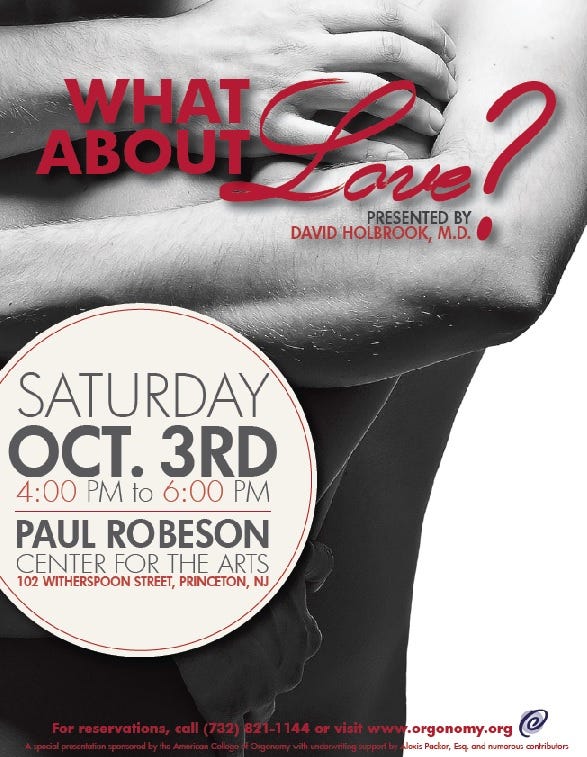What About Love?
Transcript of a presentation I did in 2015, with video links
[Video clip of the song, “Bess, You Is My Woman Now,” from the musical “Porgy And Bess” by George and Ira Gershwin”]:
"What About Love?"
My teenaged son used to say these exact words to me. We would be talking about some personal or family or sociological matter and he would say, "What about love? Where is the love? Where has all the love gone? Why can't people just love each other?"
I don't know how far I can go towards answering these questions or how successfully I can EXPLAIN what love is; but I'm going to at least try to SHOW us some things which can remind us of what love is; and I will share some perspectives which might help us get at least a little closer to understanding something about what love is and how love might function.
I'm also going to try to show the contrast between soft, gentle, open-hearted loving and harsh, "armored" loving.
My main theme will be romantic love, but I will also attempt to help us think more broadly about other aspects of love such as family love, love of country, and love of nature.
So let's get started. I would like you to think back for a moment to the “Bess” song you just watched now. How did it make you feel? Did it evoke any thoughts? Did you have any bodily reaction to the song, any sensations?
As a sharp contrast to the “Bess” video, I'd like to show you a short segment from the sixth-best-selling song worldwide in 2014:
[Video clip of "Timber" by Pit Bull and Kesha (it’s only necessary to watch the first 60 seconds to “get the message“ of the video:]
The psychiatrist Wilhelm Reich had some things to say about the difference between armored love and unarmored love:
"The inner make-up of the love function determines every single feature in every single other activity of the individual."
By this, Reich was referring to the fact that the way that a person feels and expresses love reveals the most fundamental aspects of their character.
Reich again:
"Full living means full surrender to any kind of functioning."
Here, Reich is describing how a person who is able to give themselves over fully in their love life and find full satisfaction, is also able to give themselves freely and fully in other areas of life such as in their work and in their pursuit of knowledge.
Naturally Growing "Marriage":
Again from Reich:
"Life simply loves....Life...lets its love relationships grow slowly....Life does not rush....It is in no hurry....Nothing is there to 'prove' or to 'achieve' or to 'get.'....This...continuous experience of love and contact and mutual surrender....goes with every naturally growing marriage."
[Reich, W. 1953/1961. The Murder of Christ. New York: Farrar, Straus and Giroux, Pages 26-32.]
[Video clip of "One Hand, One Heart" from West Side Story"]:
I want to discuss our impressions of this clip in a moment, so keep those impressions in mind. But first I want to show you one more short clip and then tell you a short story. For a contrast to the clip from West Side Story, how about a clip from the movie, "Friends With Benefits":
To be fair, in the movie they eventually realize that the "friends with benefits" approach doesn't work. Ultimately they develop an emotional bond and fall in love. But in real life, many young people suffer under the illusion that it's possible to be sexually involved with another person without emotions being involved or affected.
One college-aged patient of mine told me a story of meeting a girl at a bar and realizing that he really liked her. He had the impression that she clearly wanted to have sex with him that night, but he was in contact enough with his emotions to feel that he didn't want to do that, because he felt certain it would destroy any prospect for developing a genuine relationship with her later on. He told me that what he had really wanted to do was ask for her phone number so that he could call her up and invite her to lunch. But because of what he described as the current culture of young people, where any real emotional connection is avoided, he feared that if he asked for her number and called her for lunch, she would run away emotionally and any chance of developing a relationship with her would be dashed. In other words, she would be willing to sleep with him, but not go to lunch with him. So he declined her offer of going to another bar, where he knew they would've made out and then have gone somewhere and had loveless sex, and he opted instead to hope to bump into her by chance on future occasions at the bar, and to gradually get to know her that way.
Does West Side Story present an idealized version of romantic relationships? Or not?
The Vital Importance of Family:
I would like now to attempt to broaden the discussion to take a look at other forms of love besides romantic love. I'd like to take a look at love between parent and child.
I will be showing some more movie clips in order to evoke in us the emotions that accompany our awareness of the vital importance of family. When you are viewing these clips, please once again pay attention to both your thoughts and to your physical sensations as you feel the various emotions that are stimulated.
[Clip from "To Kill A Mockingbird"]:
The love relationship between the parents sets the stage for the development of a family. At the center of the family is the relationship between the parents, which itself generates the atmosphere that the children grow up in. The love that is available for the children is itself an outgrowth of the love between the parents.
[Clip from "It's A Wonderful Life"]:
Love of Country:
I'd like to move on now to another kind of love: love of country. Again I'd like to show a clip that I think can evoke some emotion in us, and I'd like us all to note how this, the third kind of love we have taken a look at, can evoke emotions and bodily sensations that are similar to those stimulated by the first two kinds of love that we have looked at. And it is interesting to reflect on the fact that political feeling can have such a powerful emotional basis.
[Clip from "Mr. Smith Goes To Washington"]:
Love of Nature:
I would like to evoke in us one more form of love: love of nature. And once again, I would like us to notice the emotions and bodily sensations that nature can stir in us. Surely all these different forms of love have some kind of common root?
[Clip from Planet Earth: Amazing Nature Scenery]:
Why Can't People Love?
So, the obvious questions now are: why can't people love; and how can they be helped to be better able to love?
Reich discovered in his work as a psychotherapist that:
“[People have] not only lost their ability to give and take in the process of loving but have made love itself an object of a deadly fear..."
[Reich, W. 1946/1999. American Odyssey. New York: Farrar, Straus and Giroux, Page 343]
Character Armor—psychological attitudes:
Reich found that people have developed what he called "character armor," which consists of chronic attitudes:
These attitudes function to help prevent the individual from feeling the emotional pain associated with mistreatment or neglect.
Tissue (e.g. muscle) Armor—impeded flow of bioenergy:
Reich also found that the character armor was accompanied by an armoring of the body's tissues, for example muscles:
Reich discovered that this body armor serves to contain and defend against uncomfortable emotions--remember the sensations you felt in your body that accompanied the emotional reactions you had to the songs and movie clips?
Unfortunately, a by-product of this body armor is the creation of chronic muscular tensions and rigidities, along with alterations of blood flow and the supply of biological energy to the various organs of the body.
The net result of all this character and body armor is that people lose the capacity to surrender to love in a spontaneous and undefended manner--they actually become afraid of emotional vulnerability and relatively incapable of it; their attitudes and ways of functioning take on a rigid, harsh, unfeeling, and sometimes cruel quality. Sex without love might be possible, but the integration of love with sexual expression is blocked, and with that, full psychosomatic satisfaction is unattainable.
So: How to help people to be better able to love? Well, this inability to love and its causes needs to be addressed both on an individual and a societal level.
Orgone therapy:
On the individual level, Reich developed a form of therapy called “orgone therapy” which addresses both the characterological and somatic armoring which is preventing people from feeling and loving. Social and medical orgonomists trained at the American College of Orgonomy's clinical training program in Princeton, New Jersey are able to practice this form of mind-body therapy.
On a societal level, Reich discovered that these chronic characterological and somatic rigidities are transmitted from person to person throughout society by means of the way we treat each other. Dysfunctional attitudes are enshrined in a variety of social institutions and practices which serve to promulgate and maintain ways of living which lead to the crushing of the human spirit and the destruction of people's capacity for love and understanding.
The Emotional Plague
Reich called this sick societal process "the emotional plague." The emotional plague is passed on from generation to generation by societal and familial institutions and modes of individual behavior.
So we can see that there is a dynamic cycle here between the individual and society. Society and its institutions passes on the emotional plague to individuals, who then in turn pass it on to each other and to succeeding generations through both the ways they treat the individual persons they come in contact with, and through the maintenance and promotion of societal institutions which spread the plague.
The emotional plague is present in one form or another in all of us. In fact, for the orgonomist trained at the American College of Orgonomy, in a sense the emotional plague is our patient, both when we do our therapeutic work with individual persons, and when we attempt to spread awareness on the societal level about the nature and destructiveness of the emotional plague.
Love:
And could it be that we have an answer to what love is? Perhaps love can be defined as simply the free-flowing, spontaneous experience of unarmored emotion from the biopsychological core of human beings.
["Somewhere" from “West Side Story”]:


